FAQ: Which Tea Has the Highest Amount of Antioxidants?
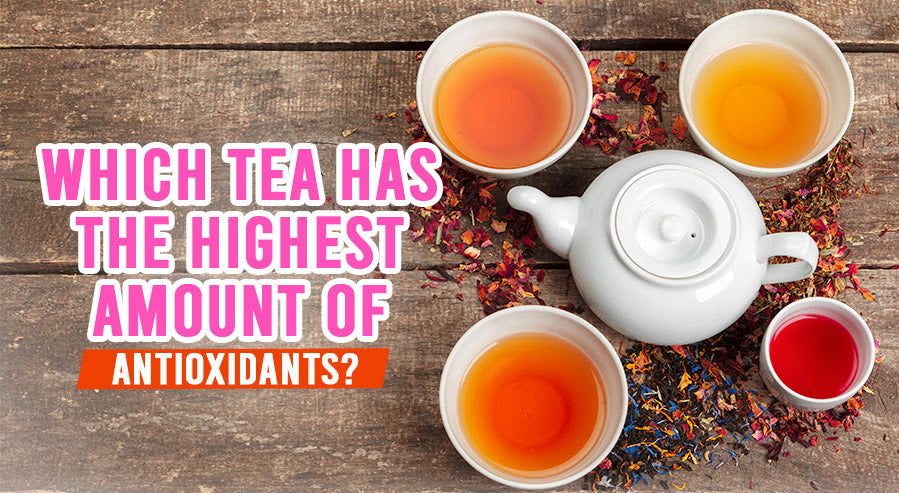
You need to know the difference in antioxidant content in various teas if you want to take care of your health. Antioxidants play a big part in health since they fight off the bad things free radicals cause. If they aren't controlled, then free radicals could mess up your cells, and that could lead to big health problems like heart disease or cancer.
Think about tea - I'm talking about a comforting drink, a big factor in delivering antioxidants. There are a ton of types, like green, black, oolong, and white tea - and they're loaded with all sorts of beneficial things, which makes them way more than tasty drinks.
Picking out a tea with lots of antioxidants can be a bit tough. Each kind has its own mix, but if you know a bit about these blends, you'll be able to find a tea that does the job and tastes great - talk about win-win, right?
The importance of using tea for health benefits is to know how many antioxidants each type has. Why? Well, with that knowledge, you can make the most out of the power of tea leaves. So, why not start now?
What Makes Tea High in Antioxidants?
Tea comes packed with antioxidants, and they all hail from the plant known as Camellia sinensis, which is loaded with these health-boosting parts. Did you know the levels of antioxidants diverge in separate teas due to different methods used after harvesting?
One of the best antioxidants is green tea. Why is that so? Well, it's because they handle it with tender care, like steaming or pan-firing the leaves, which helps to keep a lot of the healthy things called epigallocatechin gallate (EGCG) and other catechins. These are potent antioxidants, and by the way, they are responsible for a slew of health benefits!
Teas like black and oolong are treated a bit differently - they oxidize to a great extent to provide a rich flavor and dark leaves. But sadly, this whole process can cut down on the amount of antioxidants. It's because it transforms catechins into these things called theaflavins and thearubigins.
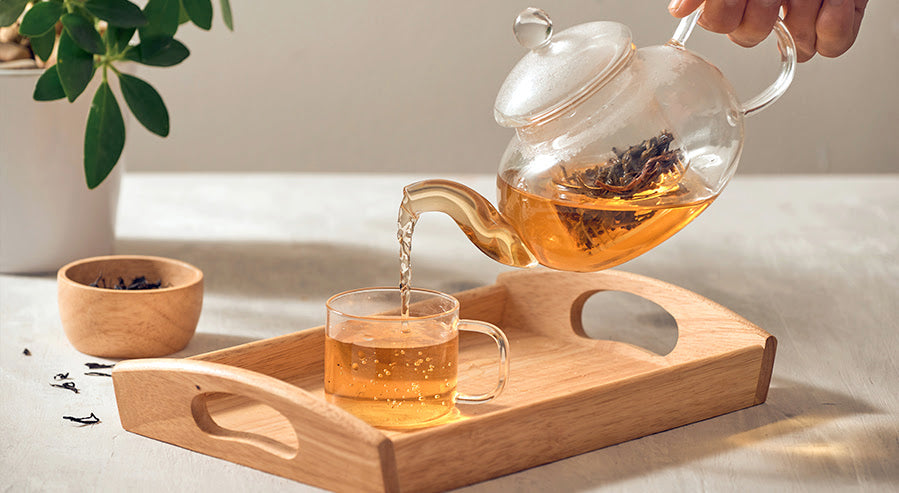
White tea, on the other hand, gets special treatment. Producers pick these leaves when they are young and covered in thin white hairs. Why does this matter? Well, they just let them dry in the sun, and the antioxidant content stays fairly high - although it's still not a match for green tea.
Then we have Pu-erh tea. This one takes a completely different route - it ages and ferments. This gives it a cool and unique flavor for sure, but it also messes with the structure of the antioxidants. Basically, it lowers EGCG levels and pumps up another antioxidant, the brownie.
If your goal is to nab some antioxidants with your tea, you'll want to stick with green or pu-erh teas. They're packed with catechins and the brownie, in that order. And if I might make a suggestion here, the tea that's best for you is the one that brings the most health benefits you're looking for from drinking tea.
#1: Green Tea and Matcha
Have you heard about green tea and matcha? They're full of antioxidants. This is because they're especially high in catechins. These are just natural phenols and antioxidants - nothing overly complex. They contain a cool compound, EGCG, that comes packed with health benefits.
So, what's so special about this EGCG? It's quite good for our hearts. How so, you ask? Well, it can help to reduce those bad LDL cholesterol levels - meaning it was built to cut down on heart diseases. Also, it ramps up weight loss by boosting metabolism and helping with short-term fat burning. They say EGCG might even have anti-cancer properties, uniquely nixing cancerous cells while leaving healthy ones alone.
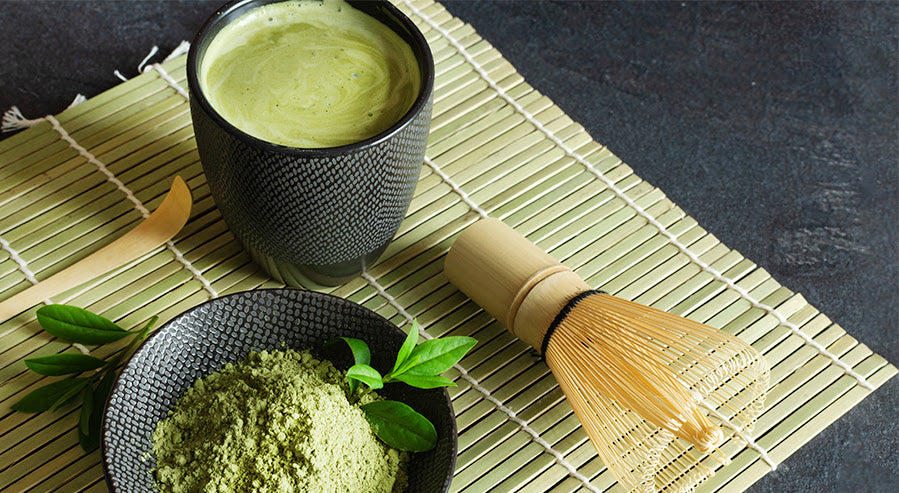
Let's talk a bit about green tea and matcha. They both come from the same plant, the Camellia sinensis, but they offer different antioxidant potentials. How? It's all in the way they're grown and processed. For instance, matcha leaves are grown in the shade to increase their chlorophyll and antioxidant levels. After that, they're turned into a fine powder.
You might be wondering why any of this matters. The whole matcha leaf is consumed, which boosts the concentration of EGCG compared to just brewed green tea. The research shows matcha could have three times the EGCG of even the best green teas. This pretty much cements matcha as a super strong antioxidant source.
Deciding between matcha and regular green tea for boosting your antioxidant levels? Sounds like choosing matcha might be a smart move. At the end of the day, both green tea and matcha have impressive antioxidant levels. But matcha stands out thanks to its unique preparation method. Therefore, if you want to really up your antioxidant intake, picking a cup of matcha might be your best bet.
#2: Black Tea
Black tea has found a place in our hearts with its strong taste and fascinating aroma, right? That, but it also boasts of an important stockpile of antioxidants like tannins. To get our beloved black tea, tea leaves undergo a change. The process involves altering catechins, which are the main antioxidants in fresh leaves, into something we could call super tannins - theaflavins and thearubigins.
In the making of black tea - oxidation gives it its unique dark color. But guess what? This process does nothing to dampen its antioxidant prowess. Quite to the contrary, it shields and maintains these properties. This protects black tea's status as a wealthy stash of compounds that improve our health.
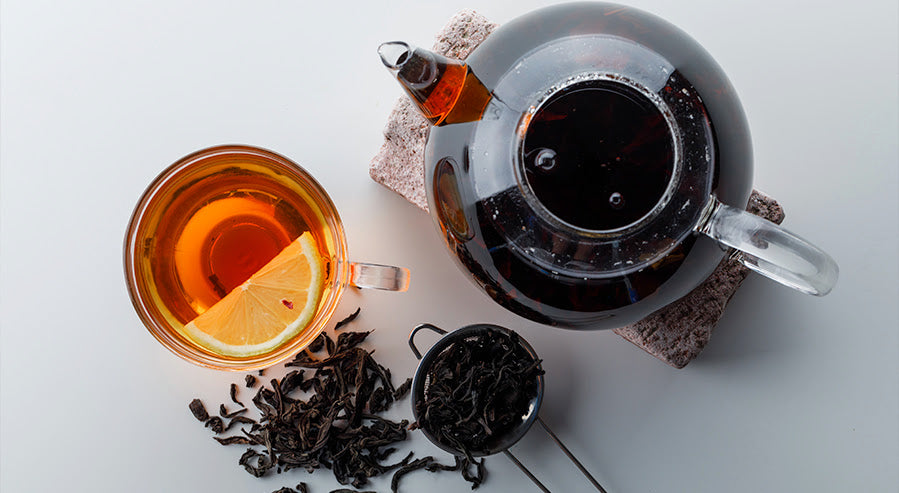
You may be wondering about what this does for your health - let's talk heart. Loads of studies give us hints that making black tea your regular pick-me-up could lessen your chances of heart disease. We're talking about better cholesterol numbers, lower blood pressure, and more efficient blood vessels.
So, let's pose a question - should that morning cup of coffee take a back seat to black tea? The high antioxidant quotient definitely makes a compelling case to answer "yes." Drinking black tea routinely could have a good effect on your heart health and could even help you stick around longer. And here's a thing you might not know - the proper taste of black tea satisfies your taste buds; black tea offers loads of health benefits as well. Just think about it: the next time you sip your black tea, both your taste buds and your heart will be cheering!
#3: White Tea
Compared to black and green teas, white tea is simpler to prepare. It's harvested early and then air-dried to prevent much oxidation and save many helpful catechins - granting it unique antioxidant benefits. And, because it's not oxidized much, white tea lessens its tannic acid content, which makes it different from other tea types.
White tea is filled with catechins that act as powerful antioxidants. These take on harmful free radicals inside your body, keeping everything nicely balanced. You got that right; white tea is a big health ally!
This type of tea also boasts strong anti-inflammatory, anti-bacterial, and anti-viral properties - quite the triple threat! It's even believed to promote weight loss and heart health and might limit cancer growth. So, could white tea be the best health hero compared to green and black teas?
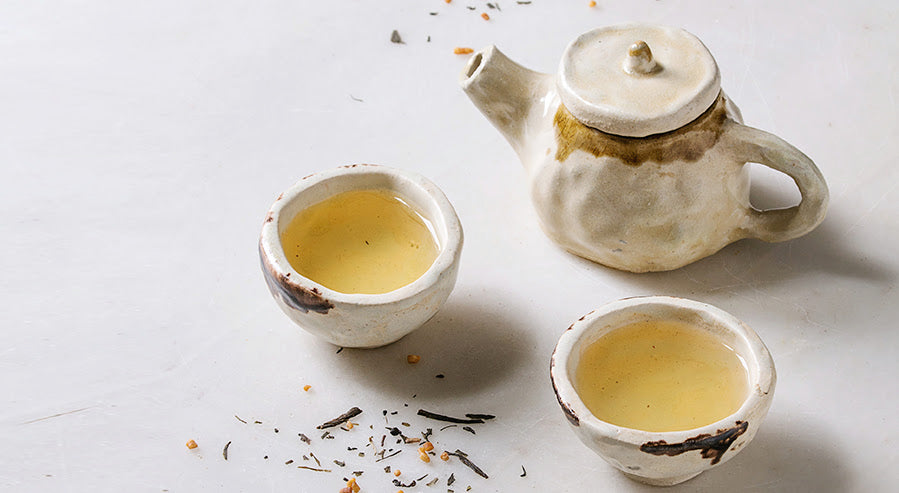
Green tea, on the other hand, is famous for bolstering mental and cardiovascular health and stabilizing body temperature and blood sugar. And black tea? It's championed for improving heart health and lessening the chance of type 2 diabetes. Who wins? It all comes down to catechins. Since white tea has a touch more, it could offer more potent antioxidant benefits.
White tea, with its rich catechins and low tannin, could be seen as a healthier alternative to many other types of teas.
#4: Oolong Tea
Oolong Tea really shines! Do you know why? Because it comes straight from the Camellia sinensis plant, including its leaves, stems, and buds. This tea has a one-of-a-kind half-fermentation process. How does it work? Well, the plant's leaves are gently dried under strong sunlight and then rolled to start oxidation. Here's a fun fact: this part-proof oxidation is what sets Oolong apart from its buddies, green and black tea. The result? A deep antioxidant profile.
When you look at how Oolong is oxidized, you'll see it's a kind of bridge between green and black tea. This means Oolong holds on to a lot of those healthy antioxidants -the ones they call polyphenols - even more than fully oxidized black tea. But if you stack it up against green tea, which doesn't oxidize at all, Oolong has a bit fewer antioxidants.
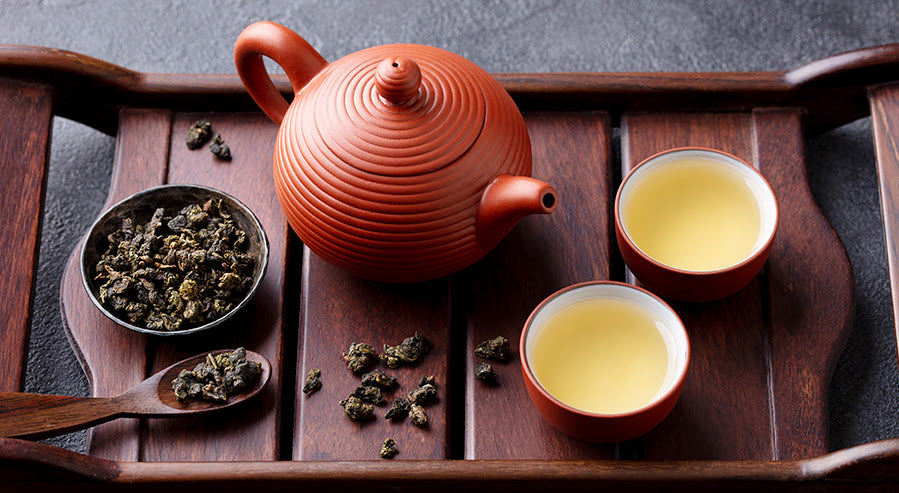
Caffeine in Oolong? It can change, usually somewhere between the amounts in green and black teas. What decides the exact amount is a mix of things. The specific type of Oolong and how long you brew it play a big part here.
#5: Rooibos Tea
How about Rooibos tea from South Africa? That thing's packed with antioxidants, too! It has these unique ones called aspalathin and nothofagin. Research suggests they can lower the risk of heart disease and cancer by squaring up against those pesky free radicals. Besides, since it's caffeine-free, Rooibos Tea is a big win for anyone wanting the benefits of tea without sleepless nights or a racing heart.
Do you know Rooibos tea, besides its antioxidants, also has polyphenols? These plant-based compounds come with a heap of health benefits. If you have plans to boost your immune system, then the antioxidant quercetin found in Rooibos can lend a hand by pumping up your immune function and cutting down inflammation.
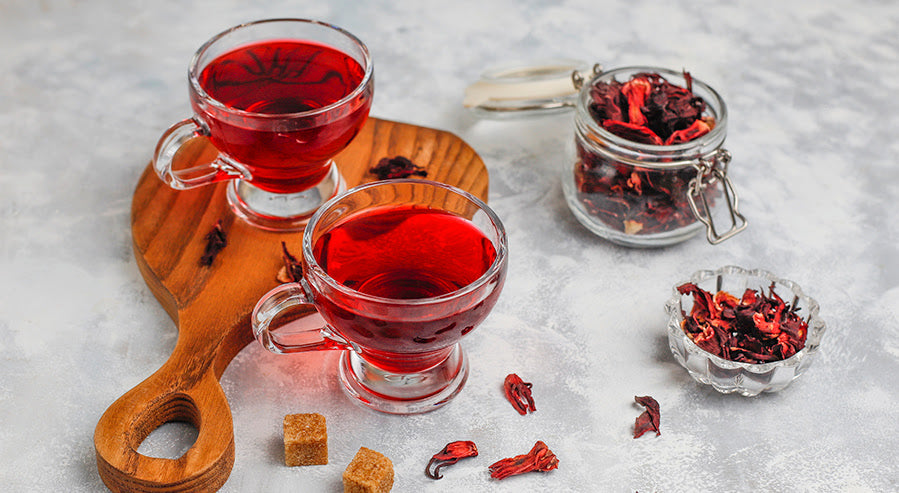
Let's talk about your gut health. Regularly having Rooibos Tea could really make a difference. Because of its high flavonoid content, it can relax your stomach muscles, possibly reducing belly pain and even helping out with digestion.
What if you want strong bones and teeth? Pay attention here: Rooibos Tea could be just the answer! It carries important minerals like calcium, fluoride, and manganese, which all help in promoting strong bones and teeth.
Doesn't it sound like Rooibos Tea could be the secret to glowing skin? It has alpha hydroxy acid and zinc - regular use, drunk or applied, could really bring out that natural glow in your skin.
Finding The Perfect Blend
One more honorable mention before we wrap up: Hibiscus tea is full of antioxidants thanks to its organic farming methods. The antioxidants come from the colorful flower parts used to make the tea. Hibiscus tea can help reduce stress, guard against nasty sickness, and improve your overall health.
Matcha green tea, on the other hand, gets plenty of shade before it's harvested. This process results in the tea having a high concentration of antioxidants. Crushing the leaves finely means extracting the highest amount of antioxidants possible.
But don't just settle for antioxidant levels when picking out your tea! Think about other things, too, like how hibiscus tea is great for your blood pressure and liver. Or how matcha boosts your brain function and alertness due to its L-theanine content. Each tea has its own special health benefits, proving that they're real heavyweights in the antioxidant game.
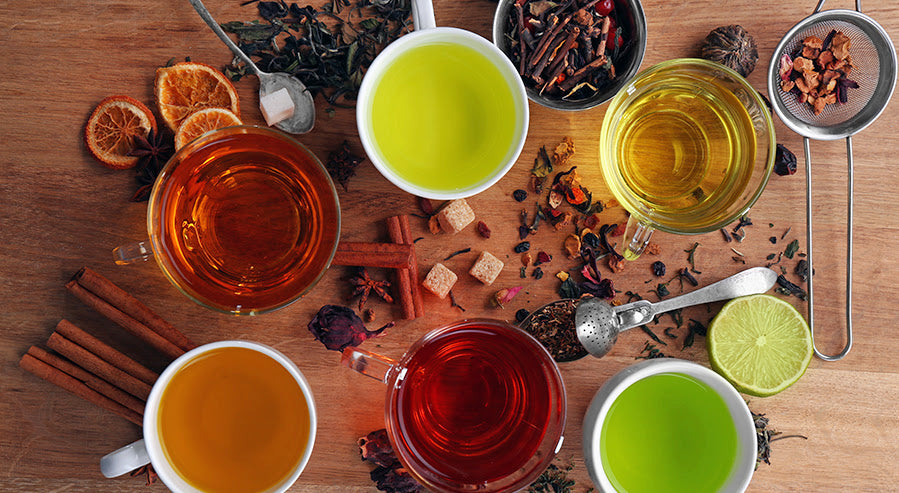
When you're in the market for a new tea, don't just think about the antioxidants - they're important, sure- but think about your unique tastes too. Did you know that teas need to strike a balance between being healthy and tasty?
You should check out Teami, our one-stop shop with a wide range of teas. Each one is unique and tailored just for you. You could need help with weight loss, sleep enhancement, immune system boost, or just overall wellness. We can help with all of it! If you're looking for a radiant look, we have products for your skin, too.
So, your next cup of tea could be so much more than a cup of tea. Considering the awesome options available can be overwhelming, but don't worry, Teami is ready to help. We're curating that perfect natural mix - just the right balance between taste and health benefits!
Subscribe to our Newsletter
Subscribe to our newsletter and get 10% off your first purchase
 Instagram
Instagram



